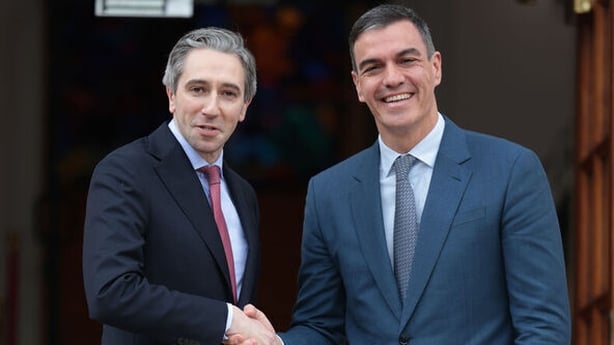Taoiseach Simon Harris has said that the point at which Ireland, Spain and other European countries can recognise Palestinian statehood is moving much closer.
It followed a bilateral meeting between Mr Harris and Spanish Prime Minister Pedro Sánchez.
He said that Ireland would move with Spain and other countries "when the time is right".
Mr Harris met Mr Sánchez at Government Buildings yesterday afternoon, the second time this week that the leaders have held discussions.
Spanish Prime Minister Pedro Sánchez has arrived at Government Buildings for bilateral meeting with Taoiseach Simon Harris @rtenews pic.twitter.com/q3fZQmv3Eq
— Tommy Meskill (@TommyMeskill) April 12, 2024
The pair met yesterday in Warsaw, at a summit hosted by Polish Prime Minister Donald Tusk.
At the event, Mr Harris said there was not likely to be an EU-wide approach to recognising the state of Palestine.
The Taoiseach said Ireland would proceed to recognise Palestine with a group of member states, although it was not clear how many that would be.
Efforts by both Spain and Ireland to recognise the state of Palestine topped the agenda in today's bilateral meeting.

Speaking in Limerick last night, the Taoiseach said both Ireland and Spain have very clearly said they want to recognise the state of Palestine - because it is an important thing to do.
He said it is now a question of when and not if that recognition takes place, and added that he would like to do it with like-minded countries and he looked forward to travelling to the European Council next week where he will talk to other like-minded countries.
He did not want to put a specific timeframe on when that recognition will take place, as he wanted to allow those conversations to happen and to allow the Government and the Tánaiste to have those conversations, but the time for it is now much closer, and it is important that it happens quickly, he said.
Ireland and Spain have also requested that the European Commission review whether Israel is complying with its human rights obligations under the EU/Israel Association Agreement.
Earlier, the Tánaiste said the European Commission is still examining the request.
Speaking on the first evening of the Fianna Fáil Ard Fheis, Minister for Foreign Affairs Micheál Martin said the letter, which was sent two months ago by then taoiseach Leo Varadkar "will be discussed again".
He said the matter had been discussed by the Foreign Affairs Council and will be "discussed further".
He said there are discussions going on within the council and within the commission.
Mr Martin described the Israeli Ambassador's statement that recognising the Palestinian state would be akin to rewarding terrorism as an "absurd and unacceptable assertion".
He said many countries all over the world have recognised Palestine as a state.
He said under the leadership of Israeli Prime Minister Benjamin Netanyahu there have been deliberate attempts to undermine the prospects of a two-state solution and said "the failure to reign in the settlements is evidence of that".
He said because of Ireland’s past history in terms of the Troubles, "the last thing Fianna Fáil is doing is condoning or in any way rewarding terrorism".
Earlier this week, Mr Martin said he would bring a formal proposal on recognition of a Palestinian state to the Government when "wider international discussions" are complete.
"Be in no doubt recognition of a Palestinian state will happen," Mr Martin, who is also Minister for Foreign Affairs, said in the Dáil on Tuesday evening.
Following that, the Palestinian ambassador to Ireland said that recognition should have already happened.
"I hope that this recognition by Ireland will be a reality soon, and Ireland will lead other EU states to follow suit," Dr Jilan Wahba Abdalmajid said.
"Ireland has always stood on the right side of history, justice, humanity international law - so I expected that Ireland will lead in the recognition of the state of Palestine."
However, asked whether Ireland should have moved to recognise Palestine a long time ago, the ambassador said: "Yes."
Additional reporting Cathy Halloran







